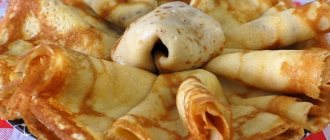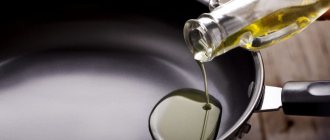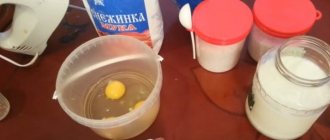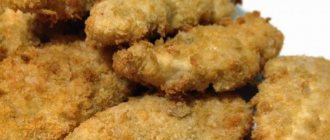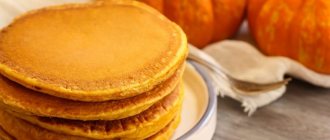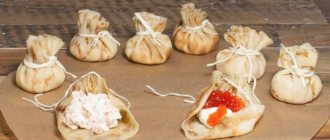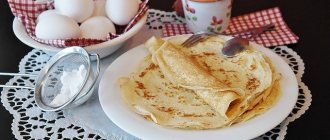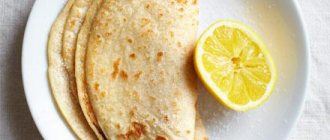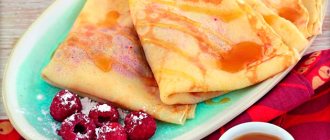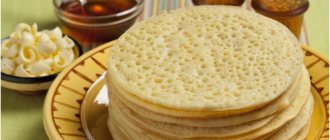An idea popped into my head, bake some pancakes, said and done!
I always use the simplest recipe, for 2 cups of milk, 1 cup of flour, 4 eggs, salt, sugar to taste, and add a little vegetable oil to the dough. In order to mix everything quickly and without lumps, I poured this entire mixture into the blender and pressed the highest speed setting, so that it would mix faster. It mixed, of course, but at the same time it whipped into foam. Baking foam pancakes is not a pleasant task, let me tell you. This foam, when it gets into a hot frying pan, dries out immediately, and the result is not pancakes, but crispy chips with holes, but I wanted pancakes ((I had to wait for the whipped foam to turn into more or less liquid dough, and bake pancakes as it should be! in the end it didn’t turn out very neatly, but it was tasty and for your loved one at night!))
Pancake batter became foam
Most likely, there are a lot of additives in flour or other components to reduce its cost. We haven’t noticed this yet, but if there are already cases of crushed glass being added to granulated sugar, then what else will happen (or will there still be oh oh oh)
In fact, pancake dough should foam; if you mix vinegar and soda, carbon dioxide is released, which is why foam forms in the dough. It will be strange if there is no foam.
But it happens when there is too much foam. In this case, it can be assumed that the milk was sour, perhaps too much soda was added.
Incorrect amount of flour calculated
The taste of pancakes depends on the ingredients added to the dough. Pancakes are made with milk and kefir. They come with yeast or soda. Sometimes mineral water, beer or even brine is added instead of water, kefir or milk.
But in each of these recipes, the main place is given to flour. The thickness of the pancakes and their strength depend on it.
If you put a lot of flour, the dough will turn out thick. This means that it will not be able to quickly spread over the pan, and the pancake will come out thick. Such a pancake will end up heavy and possibly undercooked. It can be easily turned over to the other side and removed from the pan. But when folded, it will most likely tear.
If you put little flour in the dough, then when baking it does not set, it remains liquid, and such pancakes cannot be turned over or removed from the pan without consequences.
Therefore, you need to strictly adhere to the recipe, adding as much flour as indicated.
But most often, the housewife does not rely on the recipe, but mixes the dough for pancakes from the ingredients that are available.
In this case, you first need to combine the eggs with sugar and salt, add half the liquid, and mix well. While stirring, gradually add flour. Then dilute the thick dough with the remaining liquid to the desired consistency. It should turn out so that it flows viscously from the ladle, but the stream should not be thick.
The type of flour matters a lot
Another factor that I never thought about was the importance of choosing the type of flour for pancakes, as well as its quantity. It is on these ingredients that not only the integrity of the products depends, but also their taste and even beauty.
Only on a soft spot: Russian Domostroy forbade punishing children in any other way
A broken nail is no problem: tips for treating nails at home
The newlyweds traveled all over the world and took wedding photos in every country
Particular attention should be paid to the amount of flour: if you add too little, the dough will become liquid, and products made from it will begin to tear when you first try to turn them over. The optimal consistency of pancake dough is characterized by moderate density and ductility. How to define ideal? It's simple: the mass should slowly flow from the spoon in a thin stream.
By the way, before preparing pancakes, it is important to let the dough sit for 30-40 minutes. During the specified time, the base will acquire the necessary elasticity and pliability, as a result of which the products will be intact, smooth and beautiful.
We invite you to familiarize yourself with Inhalations for a runny nose for children and adults
Inappropriate ratio of ingredients
Eggs
It is believed that pancakes tear due to the small number of eggs in the dough. But this is not an entirely correct conclusion. There are many recipes that contain only 2 eggs, but the pancakes turn out perfect.
It all depends on the stickiness of the flour and thorough mixing of all ingredients.
And in some recipes eggs are completely absent. Eggs do not need to be added to the kefir dough. But in this case, it is recommended to brew the dough with boiling water. It becomes elastic, and the pancakes do not tear when turned over.
Pancake batter made with kefir is slightly thicker than with milk or water. Because you need to take into account the thickness of kefir. To prevent such pancakes from being dense, soda or another baking powder must be added to the dough.
Soda should be mixed with flour, and not quenched in a spoon, as many housewives do. If you quench soda with vinegar separately from flour, then all the gas bubbles that make the dough airy will evaporate even before combining with flour. And then soda will be of little use.
If the pancakes tear when turning over, you can add 1-2 eggs to the dough. But you need to remember that due to the large number of eggs, the pancakes turn out tough.
Particular attention should be paid to preparing pancakes from yeast dough.
The foam makes it difficult to determine the thickness of the dough. If little flour is added to such a dough, then the pancakes from it will tear.
Eggs must be placed in the yeast dough, and they are thoroughly beaten and only then combined with a dough prepared from half the liquid and the full amount of flour. The dough is kneaded until the lumps disappear completely.
The rest of the liquid is added at the very end of the kneading. These pancakes are baked only after the dough has risen well. Do not stir it before baking so as not to destroy air bubbles.
Sugar
Sometimes pancakes tear due to too much sugar. The bottom side of a pancake made from this dough quickly begins to fry, but the top remains raw. It is very difficult to flip such a pancake entirely.
But you shouldn’t give up sugar completely, as pancakes without it turn out pale. Therefore, it is enough to put 1-2 tbsp. l. sugar so that the pancakes are moderately sweet, but not burnt.
Oil
To make the pancakes easily turn over and remove from the pan, vegetable oil is poured into the dough.
Sometimes housewives believe: the more oil you pour into the dough, the easier the pancakes will be removed from the pan. But it has the opposite effect. When baking pancakes, the oil begins to boil, the dough bubbles, its integrity is compromised, and eventually the pancakes tear.
Therefore, it is enough to pour no more than 40-50 g of oil into the dough - just enough so that the pancakes turn out moderately fatty and do not stick to the pan.
Pan
The quality of pancakes depends on the right pan.
The ideal option for baking is a pancake pan. It has low sides, heats up well and cools quickly. You just need to lightly coat it with butter first, and then calmly bake the pancakes.
If you don’t have such a frying pan, you need to take a cast iron or old “grandmother’s” frying pan with a thick bottom. No wonder grandmothers make perfect pancakes.
To prevent the pancakes from tearing when turning over, before each new portion of dough, grease the pan with a piece of lard pinned on a fork, or with vegetable oil using a brush.
It is not recommended to pour oil into a frying pan from a bottle, because then the dough does not stick to the surface of the frying pan, but rather “flows” to one edge. At the same time, the oil begins to bubble, liquefies the dough, and the pancake breaks when you try to turn it over.
The frying pan must be special
The first thing my mother-in-law pointed out to me was that the frying pan in which I tried to fry whole pancakes was universal - I cooked everything possible on it.
As it turned out, this is wrong: in every house there should be a separate frying pan for pancakes - nothing else can be cooked on it. One of the reasons for my pancakes torn was the presence of scratches on the surface of the pan; they were the ones that did not allow me to make perfect products.
My mother-in-law said that when preparing pancakes, you should use dishes with a thick bottom and low sides. In general, I listened to her and decided to go to the store to buy a new frying pan, because mine, as it turned out, was no good!
If there is a large amount of soda or sugar in the pancake batter (or worse, both), then this is not good - the pancakes will definitely tear.
The thing is that the presence of a large amount of sugar in the dough leads to the fact that the products begin to quickly fry on one side, while the other continues to remain raw. As a result, when you try to turn the pancake over, it begins to tear.
Violation of the integrity of the product also occurs if there is an excess of soda in the dough, but in this case the cause is excessive looseness of the dough.
Sometimes we wear a bra incorrectly: ways that are harmful to health
Smooth armpits without shaving: ways to remove hair using conventional products
Paralympian Talay without arms and legs: “the harder the struggle, the greater the victory”
To be more precise, in this situation the cause is not just oil, but its lack. The mother-in-law explained that this ingredient must definitely be added to the dough, but only in moderation, strictly following the recipe.
We suggest you read at what stage is Doppler done during pregnancy?
In addition, during the process of frying pancakes, the pan must be greased each time before pouring a new portion of dough into it. To do this, it is most convenient to use a special brush or an ordinary napkin.
By the way, pancakes can stick to the pan not only due to a lack of oil component. Often the cause of this phenomenon is insufficient heating of the surface of the cookware (by the way, this is why the first pancake always turns out lumpy). Common reasons also include:
- excess spices in the dough;
- dough consistency is too liquid;
- unsuitable frying pan material (the ideal option is cast iron with a non-stick coating).
If the frying pan has a Teflon coating, then this may be the problem with tearing pancakes. To avoid troubles during the cooking process, you should add a little boiling water to the pan - when it evaporates, the problem will solve itself.
Note to the hostess
- In order for the pancakes to turn out perfect, a personal frying pan must be allocated for them.
- Before pouring the first portion of dough, the oiled frying pan must be heated to a barely noticeable smoke, then removed from the stove for 5-6 seconds. And only after that pour the dough. Bake pancakes over medium heat.
- Don't be upset if the first pancake turns out to be lumpy. Usually it is used to judge how much dough needs to be poured into the pan. If necessary, add more flour or, conversely, make the dough thinner. By the way, you cannot add flour to the entire dough, as it will be difficult to get rid of lumps. You need to pour a little dough into another bowl, mix thoroughly with flour and only then combine with the rest of the dough.
And one last thing. After scraping the stuck pancake from the pan, it is not enough to just wipe it. It needs to be washed well, calcined, and then oiled again. And, most importantly, believe that everything will work out!
If there are people in the world who don’t like pancakes, it’s only because they’ve never tried them. What could be better than a stack of rosy, hot pancakes emanating with fragrant steam? And it’s all the more offensive for the hostess when her delicate, delicious masterpieces, even prepared according to all the rules, begin to tear. In fact, why do pancakes, into which so much love and care have been invested, tear? Is the frying pan not hot enough? Too thick? Wrong dough?
To prepare lacy thin pancakes, you need to know the secrets of their preparation
A trick from the mother-in-law: when the pancakes are torn, you need to add eggs
My mother-in-law told me one little trick. She said that when pancakes start to tear for unknown reasons, you definitely need to add a couple of fresh chicken eggs to the dough. By the way, this move saves the situation even if the base was spoiled by an excess of any ingredient.
The star of the series “Sultan of My Heart” spoke about the choice of his future wife
“Olga” from the series of the same name: the tragic fate of actress Yana Troyanova
From athletes to Hollywood stars: men Naomi Campbell
To summarize the above, I want to say that the problem of tearing pancakes lies in non-compliance with the proportions of products stated in the recipe.
To prevent pancakes from tearing, you must monitor the quality of the dough. The first thing you need to pay attention to is the absence of lumps - they should be broken up carefully at each stage of introducing the next ingredient. By the way, here's a little secret from my mother-in-law. It consists in the fact that first of all you should mix the liquid components of the base and only then add flour and other ingredients to them.
After the dough has been prepared and brought to the desired consistency, you should heat the pan thoroughly. The hot surface needs to be generously greased with oil, but on the advice of my mother-in-law, I recently started using pork fat, and my pancakes began to turn out especially rosy, strong and tasty.
Pancakes should be baked over medium heat. Practice shows that cooking them over high heat provokes sticking, as a result of which they begin to tear.
Seven daily habits of happy people
25 children of a childless man: an extraordinary reunion
When toothpaste is harmful to children: permissible age doses
Flipping pancakes should be done only with a wooden spatula - the use of devices made of other materials often provokes a violation of their integrity.
If the pancake turns out to be lumpy, you should remove its parts, wash the frying pan, and then dry it and, after heating it again, continue frying.
The first flour products
Pancakes are perhaps one of the most ancient options for making flatbreads. At the very beginning of their history, they were made only from water and flour, then restless humanity began to improve such a simple and tasty dish. And not only Russian people had a hand in creating pancake masterpieces. The French, Mongols, Chinese, British, Indians, and Ethiopians have similar dishes, only with different names.
And today’s pancakes have also come a long way from a simple mixture of flour and water. Now in the arsenal of a modern housewife there are recipes for dough with milk, kefir, mineral water, with boiling water, with soda, with baking powder, with rice flour, with yeast, buckwheat, carrot, apple... And this is also a symbol of the sun, so pancakes are always baked on Maslenitsa , helping the sun to quickly bring spring.
Different peoples of the world have their own recipes and secrets of making pancakes
What is pancake dough made from?
The composition of the dough for classic pancakes is extremely simple: flour, eggs, milk. Salt and sugar to taste. And then the very details begin that make an ordinary flatbread a culinary masterpiece and will not allow it to tear:
- Flour. Most often, regular wheat flour is used. The higher the grade, the thinner and more delicate they will be. There is also a special pancake flour. During production, they add soda or baking powder, milk powder, sugar, salt and anything else the manufacturer wants to make their product unique. You can simply add water to this composition and add it to the frying pan. Making good dough yourself is a little more difficult, but the taste of pancakes made from fresh ingredients will compensate for all the lost time and effort. You can choose buckwheat, corn, or rice flour, but each of them requires a special approach. If there is not enough of it, then the pancakes may tear, regardless of the type and type of flour.
- Eggs. They come in different varieties and sizes. There are recipes without eggs at all (brew with boiling water). You can use one or more eggs. This changes the taste and quality of the dough greatly. For example, 1-2 eggs will make the pancakes lacy, and if you overdo it with eggs, you will end up with a rubbery cake. If there are not enough eggs, the pancakes may tear. It is impossible to indicate the exact number of eggs - they come in completely different sizes. You'll have to experiment a little.
- Milk. Not only milk is suitable, you can limit yourself to plain water or take kefir. There are recipes that use mineral water - it will make the products thin and delicate. It is better to use milk at room temperature - the flour will dissolve more easily and there will be fewer lumps. If you are preparing dough with yeast, then the milk needs to be warmed up a little. There is a chance that the pancakes will tear when folding if the dough is too thick. You can try rolling them warm (cooled ones tear more often) or dilute the dough a little with water or kefir.
Pancake batter includes simple ingredients
There are many recipes with a variety of ingredients. But you will have to figure out the proportions yourself. Try making a small amount of dough and remember (or write down) the proportions. Fry a test pancake and roll it up. Doesn't it tear? Hooray, you have your own perfect recipe.
How and what to fry on
So, the dough is ready. Can I pour it into a frying pan? Yes, under no circumstances, unless you want your pancake to break. You need to let the dough sit for a while, “rest.” It takes time for the flour to become sticky enough. In our case, ten minutes at room temperature (more is possible) is enough to prevent the products from tearing. Only after the dough has rested can you take up the frying pan.
The temperature of the pan also matters. It’s simply not possible to bake a pancake on a cold surface (not warmed up enough), it will be half-baked and will definitely tear. In an overheated frying pan, the pancake can burn, which will add color to it, but is unlikely to please the hostess. It is impossible to say for sure how long it will take for the frying pan to reach the desired temperature. Much depends on the frying pan itself and the selected temperature.
A cast iron frying pan is considered ideal. Moreover, the older she is, the better. There are special frying pans with low sides, a thick bottom and a non-stick coating. In any case, a thick bottom and a flat surface are important - this will ensure uniform heating and the same thickness of the product. A well-baked and not burnt pancake will definitely not tear.
Even the most ideal frying pan can fail if it is not lubricated with fat (a piece of lard, vegetable or butter). This method works well - add a little vegetable or melted butter directly to the dough at the end of cooking (or you can do a little of both).
During frying, you will have to stir the dough regularly, because the oil tends to float to the surface. But as a result, the pancakes will turn over well and will not stick to the pan or tear. The frying pan itself can be greased only once - at the very beginning, and always with vegetable oil (butter will burn).
Preparing pancake batter does not take much time
The next factor influencing strength is various additives (vanillin, cocoa powder, some spices). There is a possibility that pancakes with such additives will tear when folded or even when turned over.
Why do pancakes stick to the pan and tear?
- Saving eggs.
If you are kneading the dough for the first time, you must strictly follow all recommendations regarding the amount of ingredients. So, if you want to save on eggs, the pancakes will not be elastic enough. They will tear and stick to the pan, since it is the eggs that provide elasticity to the dough. However, everything can still be fixed! To make the dough more pliable and dense, add 1-2 more eggs to it and give it a uniform consistency. - Lack of flour.
If there is too little flour, the dough will turn out liquid, and the pancakes formed from it will tear when you try to turn them over. From a very thin pancake (what else can be made from batter?) the moisture evaporates instantly. A thin and loose layer remains, sticking to the surface of the pan.The batter can be thickened. Add flour to it and stir it very thoroughly, breaking up all the lumps.
And one more tip: don’t rush to bake pancakes from freshly prepared dough! Let it sit for half an hour so that the flour releases the gluten. Thanks to this, the dough will become denser and more viscous, and baking pancakes will be easier.
- Lack of oil.
While kneading the dough, season it with vegetable oil. Firstly, it helps improve the taste of the finished pancakes. Secondly, thanks to the oil, they can be easily turned over and removed.In addition, the frying pan in which you plan to bake pancakes must be greased with oil or lard (unsalted). This can be done using a paper napkin. Please note that only the bottom needs to be lubricated! Excess oil will not benefit the pancakes.
- Excess sugar and/or spices.
When preparing pancake dough, do not get carried away with spices. Vanilla, cardamom, pepper and other exotic seasonings make the dough fragile. Granulated sugar also “sins” in the same way. Therefore, if you want to add sweetness and an unusual taste to your pancakes, season them with honey/syrup/cinnamon/vanilla sugar when they are ready. The dough should be as fresh as possible. - Unsuitable frying pan.
Pancakes are a capricious product. No frying pan is suitable for their preparation. For this purpose, it is best to take a thick-walled cast-iron frying pan, the bottom and walls of which will heat up evenly.If you prefer thin pancakes, you should purchase a non-stick frying pan. The main thing is that you have separate dishes exclusively for pancakes. You cannot fry or bake anything else on it. The fact is that on the frying pans that we use every day, scratches or chips appear every now and then, and any mechanical damage leads to the pancakes breaking during the baking process.
For lovers of modern “smart” kitchen appliances, we can recommend the electric pancake maker. She can bake several pancakes at the same time. Even an inexperienced housewife can handle this unit: just set the desired mode, and the pancake maker will do everything itself. Pancakes prepared “automatically” turn out beautiful and golden brown.
In order for your pancakes to turn out “like grandma’s”, you need to bake them according to all the rules. How exactly? – we’ll tell you now.
- By kneading the dough, ensure that it acquires an even color and becomes uniform in consistency. To prevent the formation of lumps, first mix the flour with some kefir or milk. Add liquid if necessary.
- Heat the pan well and quickly grease it with oil. Only after this can you pour pancake dough onto it.
- To distribute the dough evenly across the pan (that is, to form a round pancake with smooth edges), tilt the pan in different directions.
- The fire should be moderate.
- Use a wooden spatula to flip the pancakes. First, pick up the edges of the pancake, and then turn it over completely. Pros flip pancakes by tossing them in the pan. You will be able to repeat this trick only if the dough is thick enough.
- If you cannot flip a pancake that is too thin, tilt the pan perpendicular to the surface of the stove. The pancake will come off easily.
- Be careful not to let the pan get too hot, otherwise the pancakes will burn. It is believed that the pancake is completely baked in half a minute. In reality, the cooking time depends on the thickness of the dough and the temperature of the pan. The moment when you need to turn the pancake over can only be determined experimentally. If you see that small bubbles have begun to form on the surface of the dough, and the pancake has begun to brown around the edges, feel free to turn it over.
Now you know why pancakes tear and how to avoid it. Get a separate frying pan and a wooden spatula, find a suitable recipe and start honing your skills. Do not neglect the recommendations of professionals, do not skimp on ingredients (you don’t need much for pancake dough), knead the dough correctly, do not overheat the pan and be sure to use oil. After some time, you will be surprised at how easy it turns out to be to bake delicious and beautiful pancakes that sell like crazy.
Happy experimenting!
Who among us doesn’t love freshly baked, delicious pancakes with a golden crust, which can excite all our taste buds with their aroma alone? This delicacy does not require much time to prepare, and the result will truly satisfy the needs of even the most fastidious and capricious gourmet.
But what should we do if, instead of beautiful round suns, we see sticky, falling apart dough in the frying pan, which certainly does not cause appetite, but only spoils the whole mood of both the housewife and the household? Why do pancakes tear when turned over and is it really true that the well-known proverb about the notorious pancake “lumpy” is not just a fiction, but a real reality - this article will give detailed answers to these and other questions.
If not only the first pancake, but almost half of it turned out to be “lumpy”, in this case the whole cooking process begins to only irritate and irritate, and not bring positive emotions from the culinary work done.
The hostess remains dissatisfied and upset, and relatives and friends, in order not to judge anyone, chew the incorrectly prepared dish and console the careless cook with dubious praise. To avoid such a fiasco, we will tell you what to add to pancakes so that they do not tear and what are the subtleties of preparing them correctly.
Summing up
The reasons why pancakes break can be easily eliminated:
- Batter. Few eggs or flour, lots of water, milk or kefir. Beat in another egg and bake a test pancake. If the situation does not improve, add flour and mix it well so that there are no lumps.
- Not heated frying pan. Thoroughly clean the pan to remove any stuck or torn pancakes. It is better to do this with a paper towel rather than water. Lubricate the surface with vegetable oil (lubricate, do not pour), wait until it warms up well.
- Various additives. Try mixing some dough with additives in a separate bowl and bake a test version. If it is not torn, feel free to add the selected products.
You can add various ingredients to the pancake dough and diversify your home menu.
A few important little things that will make pancakes tastier and prevent them from tearing:
- the flour needs to be sifted, this will saturate it with air and make it lighter;
- It is desirable that all ingredients are at room temperature;
- do not put too much sugar, the pancakes will burn and tear;
- pour vegetable oil into the dough (about two tablespoons per half liter of milk or kefir);
- let the dough rest, the stickiness will increase and the pancakes will not tear;
- do not rush to turn over until holes appear and the edges dry out - an undercooked pancake breaks easily;
- Place the pan on high heat first and then reduce it before baking.
Learn the secrets of making pancakes and be sure to delight your household
If the pancakes tear, don't give up. A little effort will easily correct the situation. After all, no one is born a talented cook; everyone makes mistakes. But it’s not worth giving up golden, delicious pancakes and well-deserved praise from your family.
Delicious, aromatic, melt-on-the-tongue pancakes - what could be better? A simple dish that has long won its place on the list of recipes of every experienced housewife, which is not surprising - lacy pancakes require a minimum of effort, simple ingredients and just one frying pan. The only thing that can prevent a perfect dish is the lack of proper skill, but this is an easily fixable matter. Why do your pancakes tear? Pancakes have many secrets, despite their apparent simplicity. There are only three stages of cooking - knead the dough, pour it into the frying pan and remove the finished pancake from it - which conceals some peculiarities of “production”. Let's figure out what's what.
Pancakes are torn - what is the reason?
The first damn thing is lumpy. This saying very often turns out to be true. But what to do if the dough doesn’t want to come off the pan the second or third time? The first step is to find the cause of the problem. There may be several of them:
- There are not enough eggs in the dough. When mixing pancake dough, strictly follow the recipe. The eggs bind all the ingredients together and prevent the baked goods from tearing and sticking to the pan. The lack of this ingredient disrupts the density and structure of the dough. To save the workpiece, add 1-2 eggs and a few tablespoons of flour. Mix everything thoroughly so that there are no lumps and start baking.
- Lack of flour. During frying, almost all the moisture evaporates from the dough. If the dough is too liquid, the cake turns out to be very thin and it is almost impossible to turn it over without damaging it. You can easily correct the mistake by adding a little more flour and thoroughly stirring the dough until smooth.
- Little fat in the dough. Because of this, pancakes may not release well from the pan. If you notice a problem, simply add a few teaspoons of vegetable oil to the dough.
Test preparation
In fact, this is a rather difficult stage. The whole point is to mix the dough to the perfect consistency. The definition of this very ideal is very vague, but it is usually explained as “the thickness of sour cream.” To test it, take a spoonful of dough and see how quickly it flows. Even if it is not clear, very soon you will learn to determine the thickness of the test by eye.
This very density can be achieved in two ways. First, you must stir the dough very thoroughly so that not a single lump of flour remains. The mass should be homogeneous, one-color, moderately liquid. It’s very difficult to do this with a whisk or, especially, a spoon, so don’t pay attention to opponents of modern technology and use a mixer - this will guarantee that you won’t waste the dough.
The second method is the exact amount of ingredients. Try to follow the recipe exactly - those “unimportant” 10-20 grams can turn out to be critically important for the dish and the entire balance will be upset. You should not add more flour if you think the dough is too liquid - this will also ruin the final result.
In both cases, nothing good will happen to your pancakes. If there is not enough flour, there is a chance that the pancakes will not thicken at all in the pan, but will only dry out to it, eventually burning to the coating. Excess flour will make the pancakes too bulky - you can easily flip them, but they will burn rather than cook from the inside due to their thickness. This way you will either get a burnt pancake or a raw pancake.
Turnover time
Make sure to flip the pancake at the right time. You may have to be patient to figure out exactly how many minutes you have to wait. If your pancake is correct, it will burn in a minute or two - this is very little, you need to constantly monitor the pancakes.
If you are not at all sure whether the pancake is browned, then wait until the edges are baked - this is immediately obvious. Lift one of them with a spatula and look under the pancake. The color usually spreads evenly, so if you see signs of doneness, turn it over.
Don't try to do it in one or two movements, it's useless. You can absolutely easily flip the pancake with one or even two spatulas, if it’s convenient for you, and over time you will master faster methods.
Proper and well-greased frying pan
Choosing a pan for pancakes is quite simple. All that is required from it is a perfectly flat surface so that the delicate pancakes do not stick to the recesses and do not tear. We recommend a cast iron frying pan or, alternatively, one with a special coating that protects against burning. Frying pans made of steel or duralumin require more oil for perfect pancakes, and you will have to be very careful to pour it into the pan.
The amount of oil, or rather its uniform application, is also important. You can add the butter directly to the batter, but there is a risk of ruining the recipe, so it's best to pour it into the pan, watching carefully to make sure you don't run out. As an alternative, you can use butter (this option is quite wasteful) or a piece of lard without meat streaks - this will not affect the taste of the pancakes.
Overdoing it with oil is also not a good option. The pancakes will be greasy, and the frying pan will splatter with hot fat. An easy way to avoid this: take half a small potato, wash and peel it thoroughly, cut it into two parts, stick one of them on a fork, dip it in the pasloi and use it as a brush to evenly apply the oil.
If all these conditions are met, you should get excellent pancakes of ideal shape and thickness that should not tear. If you completed everything, but this did not happen, then you definitely made a mistake in the recipe, which means that all the pancakes from this batch will be the same. Don't get discouraged and practice, or just choose a different recipe.
Recipe
Of course, no one wants to just pour out the dough that has been kneading for half an hour of precious time. To prevent this from happening to you, it is better to immediately choose a proven recipe for thin and durable pancakes, the result of which will not let you down.
What is necessary:
- Two glasses of water or milk. If you opt for milk, then do not buy skim milk and heat it before adding it to a common bowl.
- One and a half cups of flour. Take high-quality, premium and finely ground.
- Two chicken eggs. If possible, do not use special egg powder.
- A tablespoon of sugar.
- Half a teaspoon of salt.
- Two tablespoons of vegetable oil.
The first step is to pour in the flour. It will be great if you sift it before adding it. Then break two eggs, adding all the other liquid ingredients on top. To make the pancakes fluffy and “delicate,” add a little sparkling water to the dough, but do not overdo it.
Mix the dough thoroughly to the desired consistency, check that there are no lumps. After this, it is better to leave the finished dough for about 15 minutes, let it cool a little and thicken, the components will mix better.
The pan must be heated and greased, and only then pour out the dough. If you did everything correctly, then removing the pancake will be very easy, and in the end all that remains is to lightly grease each finished pancake with butter so that they do not stick to each other.
As you can see, the reasons why your pancakes are tearing are quite simple. It's not paying attention to the recipe, not having enough oil, or just being in a hurry—nothing that can't be fixed or learned.
In recipe photos we often see thin, lacy pancakes with a beautiful smooth surface, but we are not always able to get the same ones at home. It would seem that everything was done according to the described cooking recipe, but the baking did not work out; We’ll try to understand why pancakes made with kefir tear in our article. In fact, the secrets to successfully preparing homemade pancakes are simple and they lie in the most ordinary culinary actions.
Many people find that kefir-based pancakes stick to the pan and begin to tear when you turn them from one side to the other. Not every housewife can understand the reason for this phenomenon.
Therefore, before we figure out what to do if the pancakes break, let’s consider the factors that can lead to this:
- Lack of eggs or flour, and sometimes both together.
- Excess of vegetable oil and sugar in the dough.
- Violation of the dough kneading sequence.
- The pan is not hot enough for baking pancakes.
The above are 4 main factors that can lead to your favorite kefir pancakes breaking. And now more about what to do if pancakes made with kefir fall apart.
If the dough kneading technology is broken, then your baking is simply doomed to failure.
To prevent this from happening, stick to the classic recipe for making pancakes with kefir:
- divide chicken eggs into whites and yolks;
- grind the yolks with sugar, beat the whites with salt with a mixer;
- pour the mixed egg mass into kefir;
- add flour to the egg-milk mixture. Remember - you must sift the flour, so it will gain oxygen and the baked goods will be more airy;
- after that, add quicklime soda to the kefir (in the case of kefir, it is not necessary to quench the soda), a little vegetable oil;
- Let the dough sit for 15 minutes so that gluten has time to appear in it. This will provide almost a 100% guarantee that the pancakes will not tear during the baking process.
Correct proportions of ingredients
To prepare your favorite pancakes with kefir, try to use recipes tested by other housewives. It is important that the proportions of ingredients in the recipe are correct, because a lack or excess of certain products can lead to the rupture of home-baked pancakes.
For example, if the dough does not have enough flour or eggs, then it will not be sufficiently viscous and sticky, which means that the pancakes will fall apart when frying in a frying pan. To avoid this, add the missing amount of these products to the dough, mix everything well, and start baking.
The same goes for an excess of some ingredients in pancake batter, such as sugar and vegetable oil.
Excessive amounts of sugar make pancakes hard and brittle, and too much oil causes the pancake dough to crack during baking.
The situation in such cases can be corrected in one simple way - add water or milk (in a small amount) to the too sweet/buttery dough.
Pancake pan
To prevent kefir-based pancakes from sticking to the frying pan and therefore tearing, use a cast-iron frying pan for cooking. Before frying, you need to heat the frying pan to the maximum, and then grease the bottom with a small amount of vegetable or melted butter.
You can read how to choose the right pan for pancakes and at what heat to keep it in our separate articles.
There is no need to pour oil into the frying pan, grease the bottom a little before each addition of dough, this will be quite enough. Read more at the following link.
If the pancakes still burn and tear, you can use the secret method of experienced housewives: grease the frying pan with a piece of lard or add a little salt to the bottom of the frying pan. After this, your homemade kefir pancakes will not tear.
That's all the secrets of why pancakes made with kefir tear. You now know what to do in such cases. Follow simple recommendations and use proven recipes - and then your baked goods will always be perfect.
How to bake pancakes correctly without tearing: tips for beginners
Young housewives who still have little experience in baking pancakes can be given the following useful recommendations:
- You should not rely on your own instincts in preparing the dough - you must strictly adhere to all recipe instructions, especially the ratio of components;
- You cannot put all the flour into the prepared milk (water) at once, or vice versa, pour them into the flour - according to the rules, kneading occurs with the gradual introduction of the component - thus achieving uniformity of the dough;
- when using dry baking powder, you can use more of it than is written in the instructions, at least twice as much as if you were cooking using soda;
- It is advisable not to forget that you need to add a little oil to the dough - this way the product will come off the surface of the pan well;
- the process of slaking soda should not be separated from the dough; experienced chefs advise mixing all the ingredients, including soda, and only then adding diluted vinegar, citric acid, lemon juice;
- in order not to tear the pancake, you need to wait until its edges are fried and then turn it over;
- if you do not allow the dough to rise, then the gluten contained in the flour will not have time to activate, and the dough will not be elastic, as it should be so that there are no tears;
- You need to coat the already heated frying pan with oil, while not forgetting about the sides, to which the edges of the pancakes can stick.
Two video recipes for pancake dough from the chef of our website
Povarenok has many proven pancake recipes, which you can find in the video or on our website.
Happy cooking!
The ability to bake even, light, beautiful and appetizing pancakes comes with experience. Few young housewives can invite relatives for pancakes without embarrassment: at first they turn out to be very unsightly. I would like to figure out why pancakes stick to the pan and tear. It is also interesting to learn how to prevent pancakes from burning, and what to add to the dough to make it fluffy and tasty.
Below we will try to explain why problems arise when baking pancakes, and give recommendations for preventing and solving them.
Recipe for thin pancakes that never tear
Understanding why pancakes tear when turned over, you already know what to do. When something goes wrong during cooking, don’t despair. This situation can be quickly corrected by taking a few simple steps, this will allow you to successfully complete the preparation of a dish that did not start very well.
Thank you for your interest in the article “Why do pancakes tear when turned over? What to do - how to fix pancakes sticking to the pan.” If you found it useful, please do the following:
- Share with friends using the social media button
- Write a comment at the bottom of the page - share tips, express your opinion
- Check out similar articles below, you might find them helpful.
- Author: Maria Sukhorukikh
Rate this article:
- 5
- 4
- 3
- 2
- 1
(0 votes, average: 0 out of 5)
Share with your friends!
